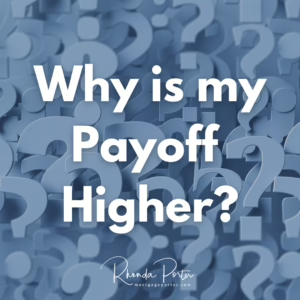The promise of not having to write a check for your mortgage payment for two months seems so tempting that many home owners chomp on the bit when a Loan Originator dangles that bait to lure in a refi candidate. The truth is you’re not skipping anything.
Typically when your close on a mortgage, your first mortgage payment is the following month after 30 days have passed. So for example, if your mortgage was closing on February 22, your first mortgage payment is due on April 1. Although it seems like you’re “skipping” a month, what’s happening here is that the mortgage interest on the new loan is prorated from the day you close. Based on this scenario, your interest is starting on February 22 and is prorated until the 28 (or 29 in a leap year such as we have this year). The 6 extra days of interest is charged to you at closing under the prorated interest on your HUD-1 Settlement Statement. Mortgage payments have 30 days of interest in arrears because of this and this is why your payoff is always higher than your monthly statements by about one mortgage payment (30 days of interest).
In order to do the “Skip Two Mortgage Payments” tango, your refinance needs to close as close to the 15th of the calendar month as possible and you, dear home owner, do not make your mortgage for that month. So using our same example, if you closed your mortgage on February 15 and do not make a mortgage payment for February, your new mortgage payment is still not due until April 1. You will have 15 days of prorated interest due at closing (half of a mortgage payment). Did you skip anything? No. You only saved writing a check. The interest is still there and nothing is free.
When home owners try “skipping” payments, they also risk late fees being assessed by the bank who is being paid off. If they do not receive the payment by the 15th, the borrower will have a late fee. Even if the escrow company wires the payoffs to the underlying lender, there’s no guarantee they will receive it in time.
Click here for a refi rate quote for your home located in Washington.
I was helping a couple with a potential refinance and they were very interested in skipping two month’s payments. This would have been especially costly for them as we were paying off a FHA mortgage. FHA mortgages do not prorate the interest when they are being paid off. It only makes sense whenever possible to close them at the end of a calendar month so that the home owner isn’t paying double interest. If they would have closed on February 15, they would have felt like they were “skipping” however their mortgage payoff would have had interest through the end of February AND they would have paid 15 days of prorated interest on their new mortgage.
Loan Originators who use “skip two months payments” are hoping to skip all the way to the bank. In fact the LO who was trying to lure the couple I helped last month was charging them 3 points for the same rate that I was offering priced with 1 point. This lender is not from Washington State and has to rely on deceptive mailers in order to get new business…I’m sure it’s because no one who has obtained from them would return or refer their friends and family to them.
There’s nothing wrong with scheduling your closing so you have the illusion of skipping two payments, just know going in what it takes to make this happen and what your risks are (late fees).
Click here for a refi rate quote for your home located in Washington.

 I am often asked this question during a refinance from homeowners.
I am often asked this question during a refinance from homeowners.






Recent Comments